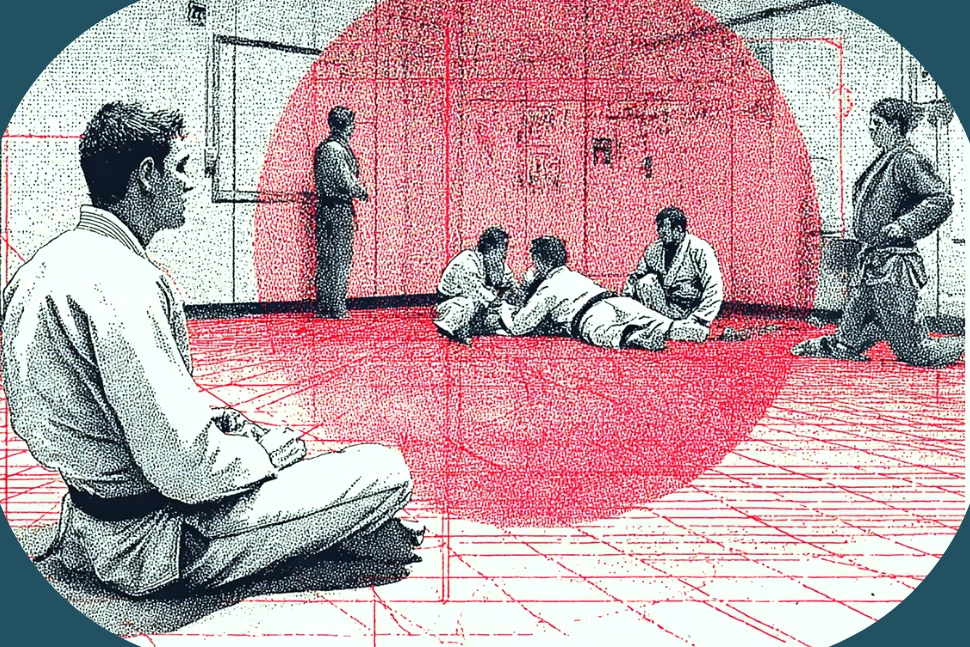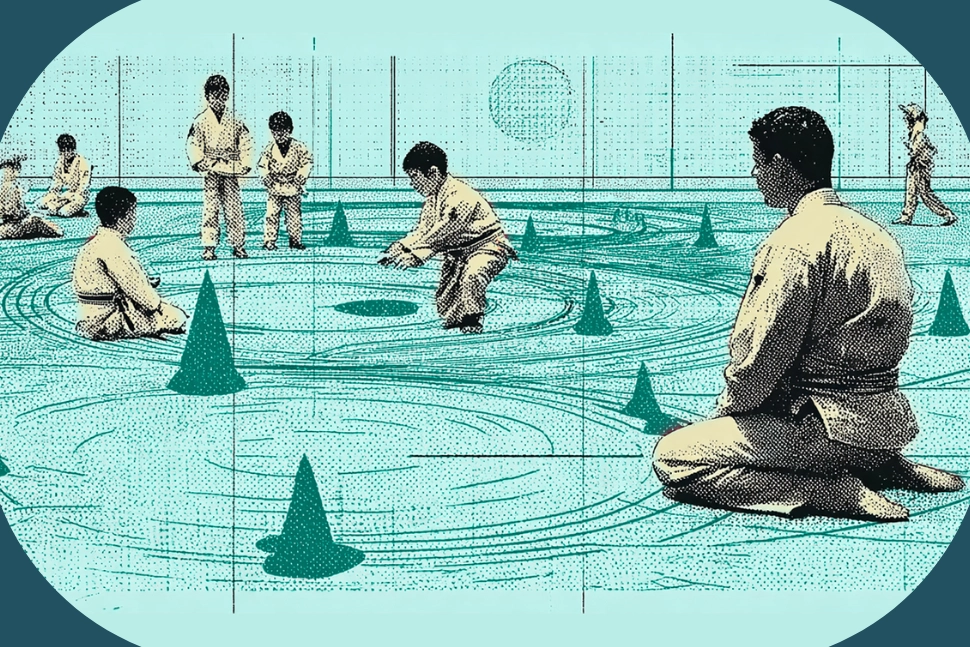Martial Arts Instructor Salary (What to Expect)

It was spring 2001. Josh and his mom walked into a taekwondo school in Winter Park, Florida for his introductory lesson and first ever martial arts training experience.
The door rang as they opened it and stepped in. To the left sat a red desk with a woman behind it, straight ahead an expansive space full of red and blue mats stretched to the back of the building, and the place smelled of freshly applied pine-sol.
The woman at the front desk wore a clean martial arts uniform. She ushered the mother and son into a spacious meeting room and asked them why they were there.
After discovering that Josh needed to learn how to be confident and enforce his own social boundaries, they began a lesson about saying no, standing tall, and maintaining eye contact (with a few kicks and punches thrown in).
As Josh skipped out of his lesson, feeling ten feet tall, he realized that someday he wanted to teach taekwondo, too.
And that passion never dissipated.
It's all you've ever wanted to do, or it's an exciting new lease on life.
Or maybe your instructor mentioned you would be a good teacher.
Those who teach martial arts find themselves there through many avenues, but they are all united by a love for sharing their art.
But passion doesn’t pay the bills, so it’s important to clearly understand what you can expect to earn. This article breaks down the factors that affect a martial arts instructor’s salary, surveys current instructor salary ranges, and highlights the benefits and perks of being a martial arts instructor.
What is a Martial Arts Instructor Job (what does it entail)?
A martial arts instructor is a qualified professional who teaches others one or more martial arts disciplines. In addition to providing instruction in the physical techniques of the art, the instructor designs lesson plans to match the student's skill levels and goals. They also provide guidance, motivation, and feedback to keep students engaged and progressing.
Instructors may operate out of a private studio or a gym or run classes in a school setting. Many instructors are also involved in marketing and promotional activities. It is common for a martial arts instructor to specialize in a specific art, such as kung fu, karate, or taekwondo. This allows them to bring their unique expertise to the classroom to inspire and develop their students' skills and confidence.
Factors Affecting Martial Arts Instructor Salary
The following factors directly affect the salary that a martial arts instructor can expect.
- Location: The geographic area in which you operate will have a direct bearing on your salary. If your martial arts studio is located in an urban setting, there is higher demand and a higher cost of living. As a result, instructors in urban areas generally make more money than those in rural areas. The local economy and cultural interest in martial arts also influence wages.
- Experience: An instructor with more experience and a deeper understanding of martial arts is able to command higher salaries. The more experience you have, the greater your ability to attract and retain students will be. This will boost your earnings potential.
- Type of Martial Art: Your income can be affected by the specific type of martial art you specialize in. The most popular martial arts, such as taekwondo and karate, have a larger market, leading to a bigger student base, which can lead to higher earnings. On the other hand, instructors who focus on less popular styles might receive lower pay due to smaller student numbers.
- School Size and Type: Large martial arts schools and private studios are often able to pay more than small schools or community centers. The financial resources, reputation, and student enrollment of the school are all factors that contribute to salary variations.
Martial Arts Instructor Salary Ranges
According to the U.S. Bureau of Labor Statistics, the average salary for a martial arts instructor is around $40,000 per year. However, this figure can vary widely based on several factors.
Salaries for martial arts instructors typically range from $25,000 to over $60,000 per year. Those on the lower end of the spectrum may be newer to the profession or working part-time in smaller or rural schools. On the other hand, experienced instructors in urban areas or those who teach at larger, more established schools often earn toward the higher end of this range.
Many instructors own and operate their own martial arts schools. They may command significantly higher earnings than the average, but they can also experience wide fluctuations in their earnings. Their income sources are not limited to student tuition but may include merchandise sales, special events, and private lessons, further boosting their annual income.

Benefits and Perks for Martial Arts Instructors
The salary is not the only benefit of being a martial art instructor. There are several non-financial benefits that come with the role, making it a rewarding career choice.
Opportunities for Professional Development and Certification: Martial arts instructors provide ongoing education and skill development opportunities. These may include advanced training programs, seminars, and certification courses. Enhancing your value as an instructor can potentially lead to a higher salary.
A Sense of Personal Fulfillment: Teaching and mentoring students can bring a great deal of personal fulfillment. It can be extremely gratifying to see them grow in confidence, skill, and discipline under your direction.
Potential for Bonuses or Commissions: Many martial arts schools have a performance-based salary plan. This plan may include bonuses and commissions tied to student enrolment or retention. So, if you excel at attracting and retaining students, you may be able to boost your base salary.
Access to Training and Equipment: Instructors often enjoy access to training facilities, equipment, and resources that they can use for personal practice. This not only helps them stay in peak condition but also allows them to continue improving their own martial arts skills while teaching others.
Job Outlook and Stability for Martial Arts Instructors
The martial arts job prospect is promising. More and more people are turning to fitness and wellness activities that provide both physical and mental benefits. Martial arts is widely recognized as a holistic activity that promotes health, self-defense, and personal development. There has also been an increasing awareness of the mental health benefits of martial arts practice. This growing awareness has driven the demand for qualified martial arts instructors.
The martial arts instructor job market can be competitive, especially in urban areas with lots of martial arts schools. That can make it difficult to stand out from the competition. To do that, you will need more than expertise in your specialty martial art; you’ll also have to show strong teaching skills, the ability to build a loyal student base, and the flexibility to work in diverse settings.
To establish yourself as a contender in a competitive landscape, you will need to demonstrate that you can adapt to changing trends and technologies. This may include integrating modern teaching methods, offering online classes, or incorporating wellness and mindfulness practices into traditional martial arts training. By staying current with industry developments and embracing new approaches, you will also make yourself more hire-able.
Strategies for Martial Arts Instructors to Increase Their Earning Potential
You must take a proactive stance to maximize your martial arts instructor earnings potential. Here are four strategic approaches that will increase your income and career prospects.
Develop a Strong Online Presence
The importance of a strong online presence through social media and a professional website cannot be overstated. You should regularly share content online, such as instructional videos, tips, and success stories. These will help you attract a broader audience and establish your reputation as a martial arts expert. A robust online presence draws in more students while also opening up opportunities for online classes, merchandise sales, and sponsorships.
Offer Private Lessons or Specialized Programs
Some students will want one one-on-one training with a specialized program tailored to their needs. You can charge significantly higher fees for these classes. Explore the possibility of offering niche programs, such as self-defense workshops, competition prep, or martial arts for specific demographics like children or seniors.
Partner with Local Businesses or Organizations
Reach out to local businesses, schools, and community organizations. This can expand your reach and open up new dreams of income. Offer to run martial arts classes, workshops, or wellness programs in order to create new revenue channels.
Consider Opening Your Own School or Studio
If you have the experience and entrepreneurial spirit, opening your own martial arts school or studio can significantly increase your earning potential. Owning a school allows you to set your pricing, schedule, and curriculum, giving you greater control over your income. While this path requires an initial investment and business acumen, the potential financial and personal fulfillment rewards can be significant.
The Role of Martial Arts Instructors in the Industry
As a martial arts instructor, you have a key role to play in shaping the future of martial arts and bringing its benefits to the public. Your influence extends far beyond your dojo. You serve as a martial arts ambassador for your community as you promote the discipline as a way of life.
As an instructor, you will be at the forefront of developing and teaching training programs for students of all ages and skill levels. Regardless of the age or skill level of the students you work with, you will instill values such as discipline, respect, and perseverance.
Your role as a martial arts instructor will probably involve collaboration with other professionals, such as personal trainers, physical therapists, and wellness coaches. By integrating martial arts with other fitness modalities, you will help your students achieve holistic health, addressing both physical and mental aspects of well-being. This collaborative approach enhances the impact of martial arts training, making it a vital component of the broader fitness and wellness industry.
Conclusion
A martial arts instructor’s salary can vary widely based on factors such as location, experience, and the martial arts discipline being taught. The national average martial arts teacher salary in the United States is $40,000, with a range from $25,000 to $60,000.
A martial arts career offers rewards beyond a salary, including personal fulfillment and the opportunity to positively impact students' lives. Some employers also include a commission or bonus structure based on student enrolment and retention.
By continuously developing your skills, embracing new opportunities, and adapting to industry trends, you can achieve financial stability as a martial arts instructor while pursuing your passion for martial arts.
Gym management software that frees up your time and helps you grow.
Simplified billing, enrollment, student management, and marketing features that help you grow your gym or martial arts school.





